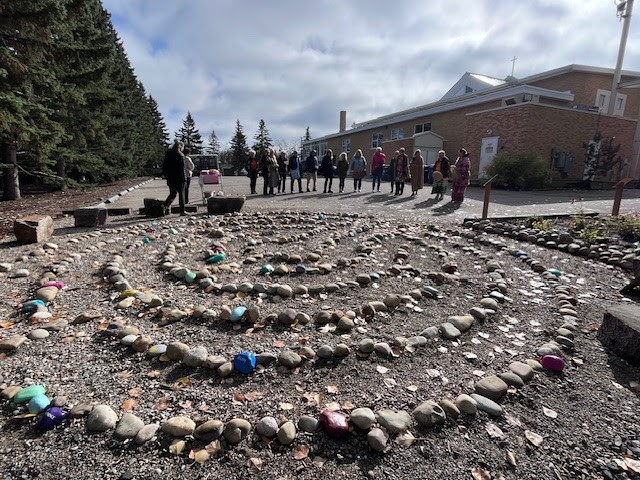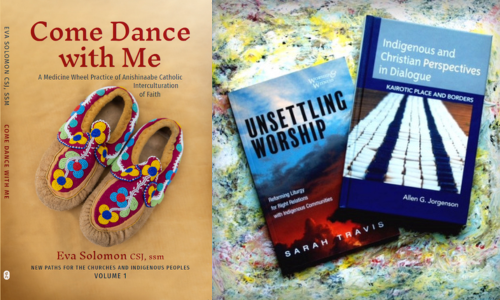Reconciliation and Indigenous Justice News from
The United Church of Canada |
|
Have a Heart Day – Sunday School Activity  United Church communities of faith are invited to mark a different kind of Valentine’s Day on February 14: Have a Heart Day. Have a Heart Day is a project of the First Nations Child and Family Caring Society, which says that “every child deserves to have a happy and healthy life.” What kinds of things make a happy and healthy life? Having a family, big or small, that loves you. Gathering together to sing and tell stories. Preparing and eating delicious foods that come from your family's background. Living on the land where your family has been for many years. Every kid deserves that. And lots of kids, including Indigenous kids, have that. Other important things are safe, comfortable schools close to home, clean water to drink and bathe in, and good medical attention. Every kid deserves those things. But not every Indigenous kid gets them. Because Have a Heart Day is about kids, it would be wonderful to involve kids in Have a Heart Day activities. This may include advocating to the government that all kids be treated fairly! Discussion• Ask the children whether they have ever heard about Have a Heart Day before. • Ask them what they think the phrase “have a heart” means. • Ask them if anything they heard today surprised them. • Explain that decision-making about what happens to Indigenous kids doesn’t really start with their parents and communities, but with politicians in Ottawa. • Depending on age, you may need to talk about how politicians are meant to listen to all Canadians, even kids. ActivityInvite the children to make a construction paper Valentine for Prime Minister Trudeau or write him a letter at House of Commons, Ottawa, ON K1A 0A6 (no postage required), pm@pm.gc.ca. Valentines may be sent by email by asking the kids to take pictures of their cards. The First Nations Child and Family Caring Society provides suggestions for letters and additional information. Have a Heart Day PrayerDear God, We know you love all children the same and want us all to grow up healthy, safe, and strong with our families and in our communities. Help us make sure that everyone has a warm home, a safe and comfy school, clean water, and the people who love us and care for us Help the people who make these decisions make them out of love. In Jesus’ name we pray. Amen
|
|
Woodcliff United Church’s Journey for Common Ground  Woodcliff United Church, Calgary, has held a series of events to support the journey of healing and reconciliation with Indigenous peoples since 2019, when its outreach committee committed to focusing on the subject. Woodcliff members reflect that their experience has reinforced the importance of listening, taking time to reflect on what they are hearing, and learning every step of the way. They speak to the critical guidance they have been fortunate to receive from Indigenous partners. Each of these individuals has been open to addressing questions from the church in a very supportive, non-judgmental manner. Woodcliff believes that without their guidance and the relationships of trust that have been established, they would not have been able to continue moving forward on their journey. For example, one of the most profound learnings came when questions were asked about a plan to establish a Medicine Wheel Healing Garden on church property. Concerns about possible cultural appropriation were taken seriously. They stopped, pondered, and sought direction from an Indigenous Elder and Knowledge Keepers who reassured them and taught them the importance of and how to go about doing things in a good way. When gathering the rocks for the gardens and labyrinth, a tobacco offering was made. A Knowledge Keeper provided guidance about the purchase of seeds and plants and their placement in the garden. As plantings were made, they smudged, sprinkled tobacco, and prayed to the Creator. Woodcliff successfully applied to the David Suzuki Foundation to become recognized as one of the National Healing Forests of Canada. The National Healing Forest Initiative is an invitation to Indigenous and non-Indigenous communities to create green spaces throughout Canada to honor residential school victims, survivors, and their families, as well as murdered and missing Indigenous women, girls, and children who have been or were removed from their families during the Sixties Scoop. Woodcliff has learned to take small steps with an open heart as they deepen their knowledge of our history. They emphasize the importance of providing a variety of ways for their faith community to learn from and connect with Indigenous leaders. They have organized a concert, film evenings, drumming, a one-day workshop, and events for Orange Shirt Day, National Truth and Reconciliation Day, the Moose Hide Campaign, Red Dress Day, Sisters in Spirit Day, and National Indigenous Peoples’ Day. They have been supported in their journey for common ground by the Justice and Reconciliation Fund. March 15, 2024, is the next deadline for applications to the Fund.[Image credit: Woodcliff United Church]
|
|
Recent Ecumenical Publications of Interest  Over the past year, ecumenical partners have published books of interest on Indigenous spiritualities, Christianity, and the path to healing and reconciliation.
In Come Dance with Me, Sister Eva Solomon of the Sisters of Saint Joseph relates the journey of some Anishinaabe Roman Catholics, like herself, to practice their faith in keeping with their Indigenous culture. Solomon describes a methodology for discernment that is respectful and inclusive of wisdom from Indigenous knowledge keepers, Christian theologians, and, importantly, members of Indigenous communities. Her invitational and intercultural approach inspires hope for healing, reconciliation, and a truly decolonized church.
From a settler perspective, Allen Jorgensen of Martin Luther University College, Waterloo, demonstrates how examining Indigenous teachings can help Christians enrich their understanding of Christian teachings. Jorgensen’s Indigenous and Christian Perspectives in Dialogue provides a useful model for how to engage Indigenous spiritual perspectives in a manner that respects Indigenous people and their traditions. This work is both academic and deeply personal. Jorgensen roots his text in the spiritual importance of the land and uses the tools of comparative theology to reflect on his relationship to the Haudenosaunee people and lands where he now lives, as well as on other spirituality significant Indigenous lands in western Canada. The book brings together wisdom from the growing body of Indigenous writers from a variety of Indigenous nations on topics of spirituality and theology. Jorgensen invites the reader to exercise imagination, playfulness, and openness to the ideas he shares. It will also appeal to those interested in theologies of place, theologies of creation, and theologies of religions, as well as to scholars of Luther and Schleiermacher!
Worship leaders will welcome Unsettling Worship from Sarah Travis of Knox College, Toronto. Travis writes in an engaging style to explore the subject of decolonizing worship in the context of Canada’s historical relationship with Indigenous peoples. She reflects thoughtfully and passionately on each and every element of Reformed worship and, perhaps most importantly, on how members of the worship community, in their diversity, respond to worship. Travis takes time to delve into the meaning of historical trauma and its impact on how Indigenous and settler Christians relate to their Creator God. She provides guidance on how to discuss the topic of residential schools with children. She asks tough questions such as what to do with those stories in scripture that seem to portray God, in Godself, as perpetrators, complicit in colonial activity and genocide. She also tackles the challenge worship leaders face of how to offer hope for the journey forward, given the many challenges that remain in our relationships. [Photo credit: Courtesy of Saint Paul University, and James Ransom]
|
|
| Donate to The United Church of Canada and help fund life changing work around the world! |
|
|
|




No comments:
Post a Comment